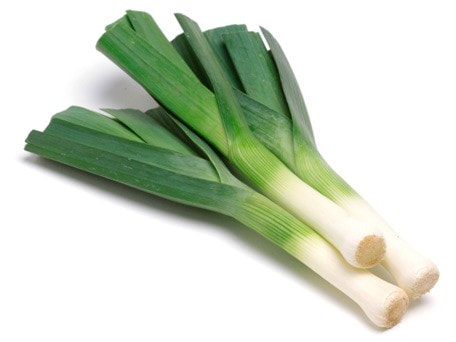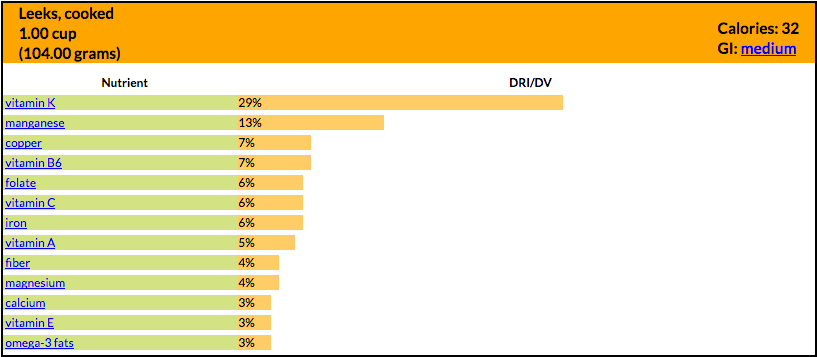|
Leeks are nutrient-rich. They contain the flavonoid kaempferol, which has repeatedly been shown to help protect our blood vessel linings from damage, including damage by overly reactive oxygen molecules. Leeks also contain an impressive amount of antioxidant polyphenols. Often overlooked, leeks have a high concentration of the B vitamin foltate, which is present in leeks in one of its bioactive forms (5-methyltetrahydrofolate, or 5MTHF). Similar to onions, garlic, shallots, and other allium vegetables, leeks also contain health-protective sulfur-containing phytonutrients. To receive these benefits, research suggests including at least one serving of an allium vegetable in your meal plan everyday. Although leeks are available throughout the year, they are in season from the fall through the early part of spring when their concentration of nutrients and flavor are highest, and their cost is usually the lowest. Leeks are considered to have a small amount of oxalates, which when accumulated may place the kidneys, of certain individuals, at risk of calcium oxalate kidney stone formation due to supersaturation of urine with calcium oxalate salts. Nutrient and Health Benefits Health-Promoting Benefits
Selecting Leeks Search for leeks that are firm and straight with dark green leaves and long white necks. They should be between 1/2 and 1 inch in diameter. As with all vegetables, it is recommended to select organically grown leeks when possible. Storing Leeks Preventing leeks from becoming limp and yellow will help protect nutrients and preserve flavor. Leeks will remain fresh for 1-2 weeks when properly stored. Preparing Leeks Properly clean and cut leeks to help ensure they will have the best flavor. After they are cut in half lengthwise, fan out the leeks and rinse again. Do not wash leeks before refrigeration because exposure to water will encourage leeks to spoil. Cooking Leeks Similar to onions, leeks are one of the most important seasonings, adding both aroma and nutrition to your meal. It is recommended to cook them just long enough to soften their fibers for better digestion and overall greater enjoyment. Researchers have well established that improper cooking, too much heat and long cooking times, can easily damage many nutrients present in leeks. For optimal results, the most nutritious way to cook leeks is to sauté them for only 7 minutes. References Mateljan, G. (2017). Leeks. [online] Whfoods.com. Available at: http://www.whfoods.com/genpage.php?tname=foodspice&dbid=26 [Accessed 4 Nov. 2017].
Mercola, J. (2017). What Are Leeks Good For? - Mercola.com. [online] Mercola.com. Available at: http://foodfacts.mercola.com/leeks.html [Accessed 4 Nov. 2017].
0 Comments
|
This portal contains research, news, information, observations, and ideas at the level of self in an effort to address lifestyle applications.
Archives
June 2024
Categories
All
|



 RSS Feed
RSS Feed

